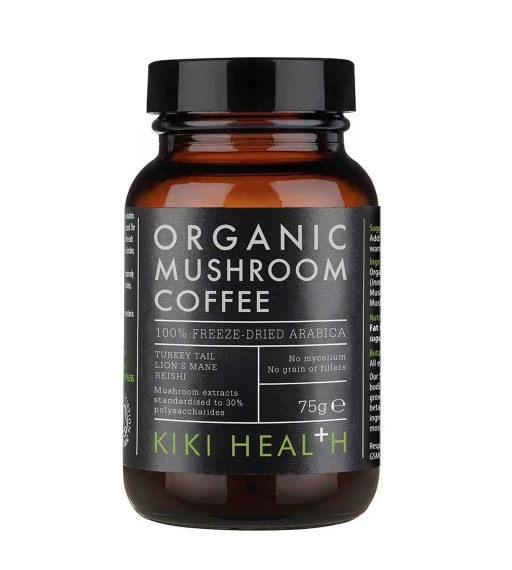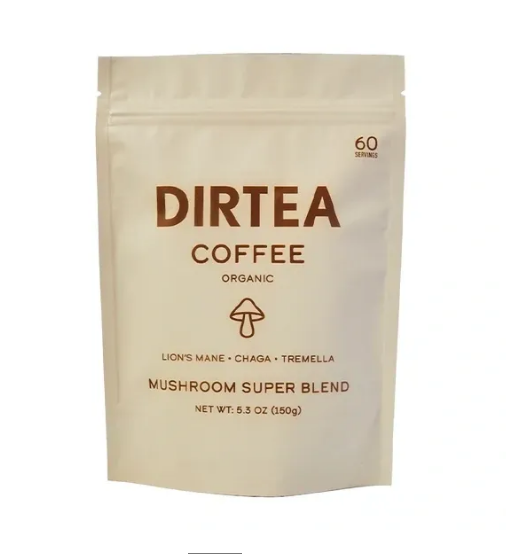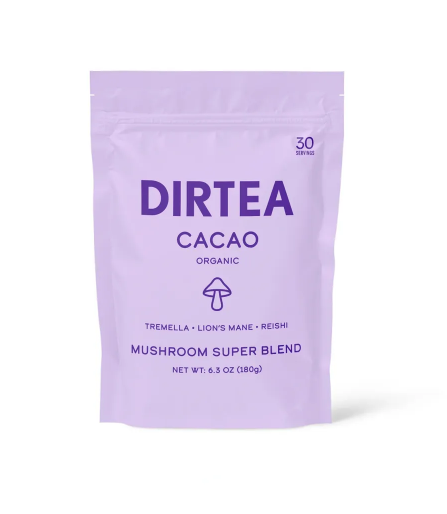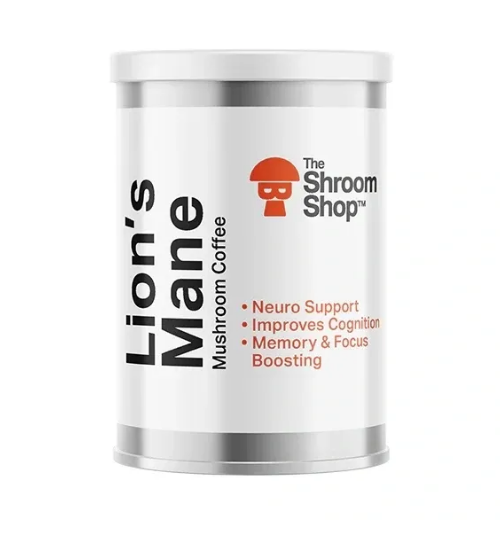I’ve been diving into the world of mushroom coffee lately, and let me tell you, it’s been quite the adventure! I tried four different varieties from House of Shrooms, each with its own unique twist. Here’s a breakdown of my experience with each one:
Kiki Health Organic Mushroom Coffee (75g)

This one was my first foray into mushroom coffee, and it didn’t disappoint. The blend features organic mushrooms like Chaga and Lion’s Mane, which added a rich, earthy depth to the coffee. The taste was smooth, with just a hint of that classic mushroom umami. I appreciated that it was organic, and it made for a solid morning pick-me-up. However, the flavor could be a bit too robust if you’re used to traditional coffee, so it might take some getting used to. Check it out here!
DIRTEA Mushroom Super Blend Coffee

DIRTEA’s blend was a delightful surprise. It combines multiple mushrooms, including Cordyceps and Reishi, creating a well-balanced cup that’s both energizing and calming. The flavor was pleasantly mild, making it easier to transition from regular coffee. I found it to be a great choice for those days when you want to stay alert but avoid the jitters. My only gripe was that the packaging wasn’t as resealable as I’d hoped, leading to occasional staleness if not used quickly. Get it here!
DIRTEA Mushroom Super Blend Cacao

If you’re a fan of chocolate, this blend is a game-changer. It combines the rich taste of cacao with the benefits of mushrooms, resulting in a decadent drink that’s both indulgent and healthy. The cacao flavor was dominant, with the mushroom essence providing a subtle undertone. This was perfect for a mid-afternoon treat. The only downside? It might not be strong enough for those who prefer a more traditional coffee taste. Available here!
The Shroom Shop Mushroom Coffee

This was a solid contender in my mushroom coffee journey. The Shroom Shop’s version has a nice blend of Lion’s Mane and Chaga, which offered a balanced flavor with a slight hint of earthiness. It brewed up nicely, and I enjoyed it as a daily morning coffee. The only thing I wished for was a bit more flavor variety or added options for different roasts. It’s a great starting point if you’re new to mushroom coffee. Find it here!
Conclusion
Mushroom coffee has been a fun and intriguing addition to my routine. Each product brought something unique to the table, from the rich cacao flavor of the DIRTEA blend to the balanced taste of The House of Shrooms Shop’s coffee. If you’re curious about trying mushroom coffee, I’d recommend starting with these options and finding which blend suits your palate best!
What is mushroom coffee?
Mushroom coffee is a blend of traditional coffee and medicinal mushrooms. Typically, the mushrooms used in these blends are adaptogenic varieties like Lion’s Mane, Chaga, and Cordyceps. These mushrooms are believed to offer various health benefits, such as improved focus, enhanced immune support, and reduced stress, while the coffee provides the familiar caffeine boost.
How does mushroom coffee taste?
The taste of mushroom coffee can vary depending on the blend and type of mushrooms used. Generally, it has a rich, earthy flavor with subtle mushroom undertones that complement the coffee. Some blends might have a more pronounced mushroom flavor, while others are designed to be more similar to traditional coffee with just a hint of the mushroom’s taste.
What are the health benefits of mushroom coffee?
Mushroom coffee is believed to offer several health benefits due to the medicinal properties of the mushrooms included. For instance, Lion’s Mane is known for its potential cognitive benefits, while Chaga is often praised for its antioxidant properties. Cordyceps may help with energy and endurance. However, the effects can vary from person to person, and more research is needed to fully understand these benefits.
Is mushroom coffee safe to drink?
Yes, mushroom coffee is generally considered safe for most people. It is important, however, to choose products from reputable brands to ensure quality and safety. If you have any specific health conditions or are pregnant, it’s a good idea to consult with a healthcare professional before adding mushroom coffee to your diet.
How do you prepare mushroom coffee?
Preparing mushroom coffee is similar to making regular coffee. Simply mix the mushroom coffee powder with hot water, or brew it using your preferred coffee method. Follow the instructions provided on the product label for best results, as preparation methods can vary slightly between brands.
Can mushroom coffee replace regular coffee?
Mushroom coffee can be a good alternative to regular coffee if you’re looking to incorporate the potential health benefits of mushrooms into your diet. It contains caffeine like regular coffee but may offer additional benefits due to the presence of medicinal mushrooms. However, if you’re used to the strong flavor of traditional coffee, it might take some time to adjust to the taste of mushroom coffee.
How much caffeine is in mushroom coffee?
The caffeine content in mushroom coffee is typically similar to regular coffee, although it can vary depending on the brand and blend. Generally, a cup of mushroom coffee contains around 50-100 milligrams of caffeine, which is less than a standard cup of coffee. Always check the product label for specific information on caffeine content.
Are there any side effects of mushroom coffee?
Most people tolerate mushroom coffee well, but some may experience mild side effects such as digestive discomfort or headaches, especially if they are sensitive to caffeine or mushrooms. It’s important to start with a small amount and see how your body reacts before making it a regular part of your diet.
Where can I buy mushroom coffee?
Mushroom coffee can be purchased from various health food stores, online retailers, and specialty shops. Some popular brands include House of Shrooms, Kiki Health, and DIRTEA. You can find their products on their respective websites or through major online shopping platforms.
Can I make mushroom coffee at home?
Yes, you can make mushroom coffee at home if you have the right ingredients. You’ll need mushroom coffee powder, which can be purchased from various brands, and your preferred brewing method. Simply follow the instructions on the product packaging to mix the powder with hot water or use it in your coffee machine.
I received these items free of charge from House of Shrooms in exchange for my honest feedback and review. While I strive to offer a fair and balanced evaluation, my opinions are influenced by my individual use and preferences. The views expressed in this review are my own and do not necessarily reflect the views of House of Shrooms. Always consult with a healthcare professional before making any changes to your diet or health regimen, especially if you have specific health conditions or concerns.
Shroom-tastic Finds: Explore More Must-Have Products from House of Shrooms
Mushrooms are not just for pizza and pasta anymore! They’ve become a popular health trend, with products like mushroom capsules, drinks, powders, gummies, and extracts making their way into wellness routines. Here’s a friendly guide to help you navigate these shroom-tastic offerings.
Mushroom Capsules
Mushroom capsules are a convenient way to incorporate the benefits of mushrooms into your daily routine. These capsules often contain powdered mushroom varieties like Reishi, Lion’s Mane, or Chaga, which are touted for their potential health benefits. According to the National Center for Complementary and Integrative Health (NCCIH), mushrooms like these are known for their adaptogenic properties, which might help the body manage stress and boost cognitive function.
Mushroom Drinks
Mushroom drinks are gaining popularity as an alternative to your regular coffee or tea. These beverages can be brewed like traditional coffee or tea but include added mushroom extracts like Cordyceps or Chaga. A study from the Journal of Food Science notes that mushroom drinks can offer an array of antioxidants and bioactive compounds. They can be a refreshing way to enjoy the potential health benefits of mushrooms, providing a less bitter taste compared to their powdered counterparts.
Mushroom Powder
Mushroom powder is made by drying and grinding mushrooms into a fine powder, which can be added to smoothies, soups, or even baked goods. This format makes it easy to increase your mushroom intake without changing your diet drastically. Research from the University of Florida highlights that mushroom powder can be rich in polysaccharides, which might support immune health. It’s a versatile addition to your pantry, but be mindful of the dosage to avoid any overconsumption of specific mushroom compounds.
Mushroom Gummies
For those who prefer a tastier, more enjoyable way to get their mushroom fix, mushroom gummies are a popular choice. These gummies often combine mushroom extracts with other ingredients to create a palatable supplement. According to research published in the Journal of Functional Foods, mushroom gummies can offer the same potential health benefits as other mushroom products, but with added sugars and flavorings. While they’re a fun way to supplement your diet, moderation is key to managing sugar intake.
Mushroom Extract
Mushroom extracts are concentrated forms of mushrooms that are typically available in liquid or powdered form. These extracts are potent and designed for targeted use, often touted for their high levels of active compounds. The National Institutes of Health (NIH) notes that extracts from mushrooms like Reishi or Turkey Tail are used for their potential health benefits, including immune support and stress reduction. However, due to their concentrated nature, it’s important to follow dosage recommendations and consult with a healthcare provider before starting any new supplement regimen.
Comparing UK and USA Laws
In both the UK and USA, mushroom products are regulated to ensure safety and efficacy, though the specifics can vary. In the UK, mushroom supplements fall under the jurisdiction of the Food Standards Agency (FSA), which mandates that all health claims must be substantiated and that products must meet safety standards. The Medicines and Healthcare products Regulatory Agency (MHRA) also oversees products that make medicinal claims.
In the USA, the Food and Drug Administration (FDA) regulates dietary supplements, including mushroom products. The FDA requires that these products be safe for consumption and properly labeled but does not evaluate the efficacy of supplements before they reach the market. Both countries emphasize consumer safety, but the UK has stricter regulations regarding health claims compared to the USA. Always ensure that you purchase from reputable brands and consult with healthcare professionals if you have any concerns or questions about mushroom supplements.
- What Makes CBD Gummy Edibles Effective For Stress Management - May 29, 2025
- Light Eyes Ultra – Dark Circles Treatment Near Farnham, Surrey - May 29, 2025
- How To Tell If You’re Being Breadcrumbed And How To Escape It - May 28, 2025

